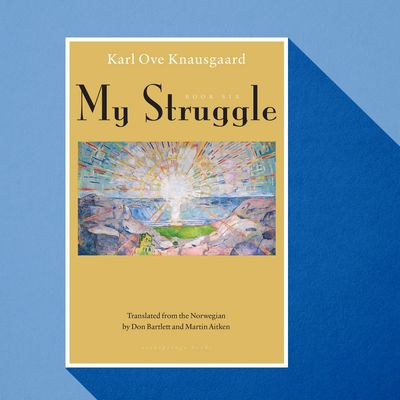
It shouldn’t be surprising that a man who has written six autobiographical novels — 3,600 pages describing his every coffee refill, kindergarten drop-off, and florid musing, along with the odd bowel movement — might have a predilection for narcissism. As Ryu Spaeth explained in a new profile of the author for the New Republic: “Knausgaard has built his reputation on a talent for self-obsession.” He also has a reputation for mercilessly dismantling everyone else in his life, extracting from his nearest and dearest what Daniel Mendelsohn describes in The New York Times Book Review as “a gruesomely high price to pay for his lofty literary aims.”
Book Six, the concluding volume of this enterprise and Karl Ove Knausgaard’s avowed final work of autofiction, was written in 2011, just as Book One was being published in Norway (Knausgaard can churn out 20 pages a day), and dwells on the wild fame (and infamy) that followed. Critics are torn on the merits of this last book: Dwight Garner called it “so dense and so dull that time and light seem to bend around it,” while the Guardian declared it “worth the wait.” But the question undergirding nearly every review of the now-complete series is whether he regrets that his quest for truth upended his entire family. His uncle Gunnar wrote him an email with the subject header “Verbal rape,” then attempted to sue him. Worse, his now-ex-wife Linda suffered a nervous breakdown after he recounted for all the world, among other things, the story of how he’d tried to cheat on her. One in nine Norwegians own his books, and the international literary scene cranes its pencil neck at the slightest glimmer of his silvery mane. But is he sorry?
“This novel has hurt everyone around me,” Knausgaard writes in the 1,200-page Book Six (titled, accurately and melodramatically, The End). “It has hurt me, and in a few years, when they are old enough to read it, it will hurt my children.” But then he gives himself a conciliatory pat on the back: “If I had made it more painful, it would have been truer.” (He also encloses a 400-page essay on Hitler — as you do when you’ve named your books after Mein Kampf — which he told Spaeth was “the only thing that I really thought was fun to write, because it wasn’t about me.”)
As he admits in Book Six, Knausgaard dialed back the truthiness in books Three, Four, and Five, betraying what Mendelsohn calls “his ideological commitment to minutely representing reality.” In the final volume, critics agree, he returns to form in this regard. “He is willing to expose not only his visceral fear, but the almost gauche lack of forethought he has given the matter of publication,” writes Alex Clark in the Guardian. “It makes for a weird kind of feedback loop in which the author berates himself for his previous intrusions into others’ privacy while simultaneously trespassing once again.”
As Mendelsohn writes, “his books constitute a kind of genre novel in which the author himself has become the genre.” In Book Six, the work turned (even more) self-referential: Knausgaard was writing about himself thinking about himself writing about himself.
So, then, is it the shame or the transgression that gets the last of so many words? In Bookforum, James Camp points out that Knausgaard is always tormented, even as he marches forward into potentially exploitative territory: “The closer Book One gets to the printers, the more Karl Ove seems to shrink from its consequences. He can’t bear to look the people he’s written about in the eye.” Tablet writer Dan Grossman believes that even here, “Knausgaard is held back by shame.” Garner disagrees: “He would not, you sense, have changed a word. Knausgaard remains Knausgaard.” Spaeth considers his Linda revelations Knausgaard “at his most terrible,” and reminds us that the author believes “his book fell short because he was not callous enough, because he could actually feel the pain he was inflicting on the people he was writing about.”
But now that his struggle has ended, Knausgaard’s life has changed dramatically. He’s divorced his wife and found love with a new woman who works in publishing (they’re engaged); he splits his time between London and small-town Sweden. “If I had known the consequences I wouldn’t have been able to do it,” he told the U.K.’s Evening Standard. That’s hard to believe from a man walking the streets of London with the attention of the literary world and money in his back pocket.

